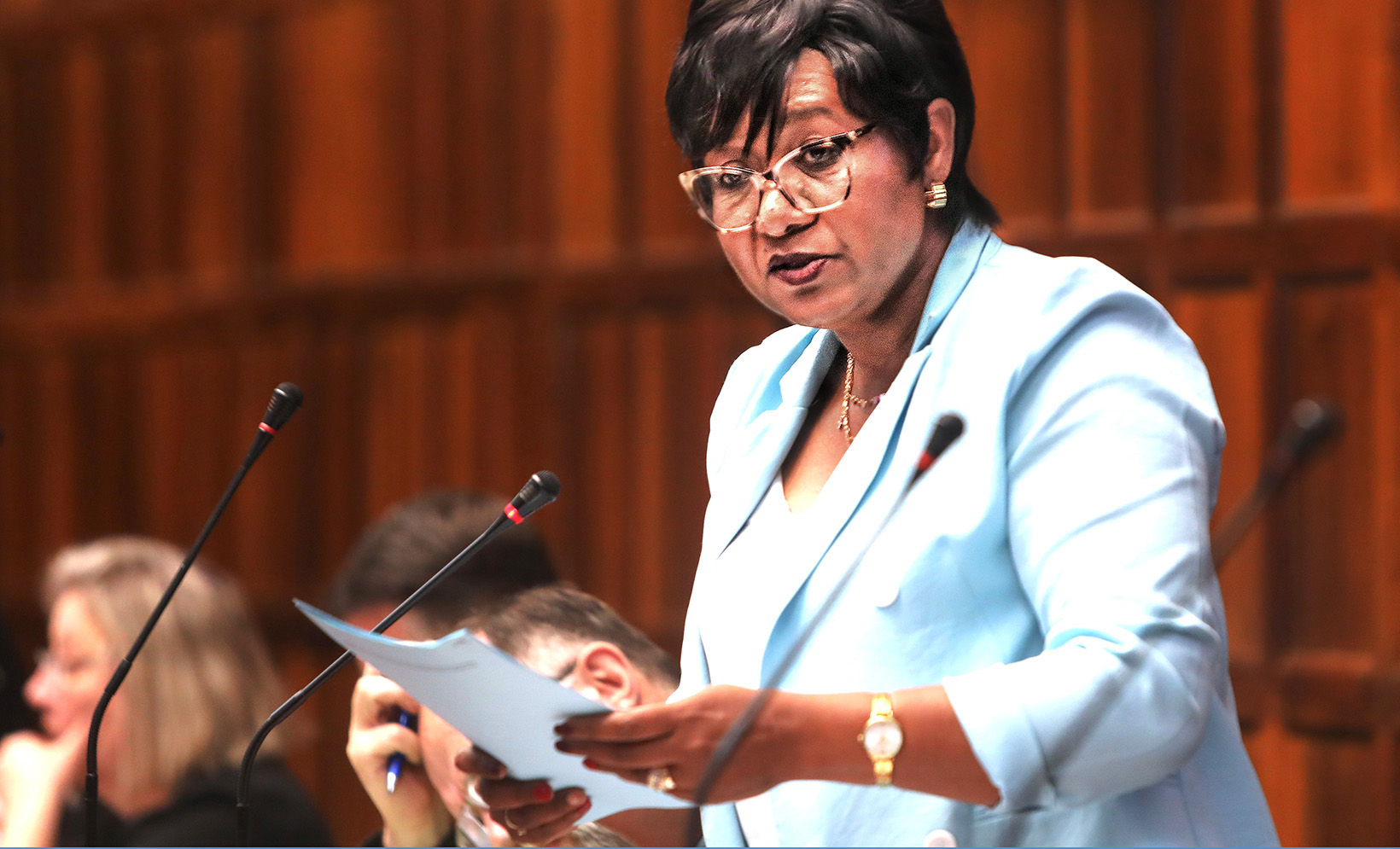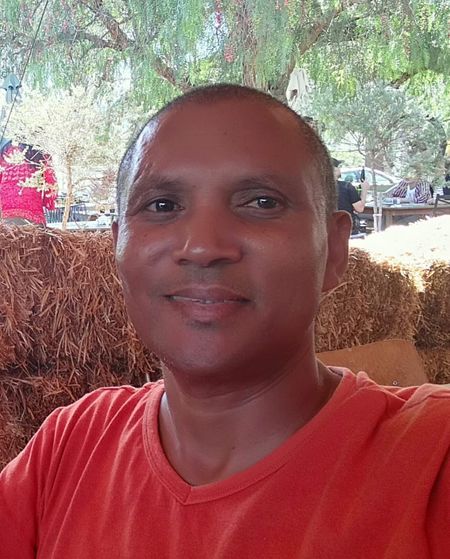“Before I became a member [of the legislature], I was a mother – and as a parent, I stood confronted with a painful truth: our children are being lost, stolen by gangs, by drugs and by despair,” said DA deputy chief whip Wendy Kaizer-Philander on Thursday, 13 November.
/file/dailymaverick/wp-content/uploads/MomsProtestingHanoverPark.jpeg)
Her words echoed through the Western Cape Legislature as she tabled a motion on the brutal killings of children and also their grooming into becoming gangsters, a debate that soon spiralled into heated exchanges and political finger-pointing.
The motion demanded urgent, lasting reforms to confront the conditions turning children into victims and perpetrators – a crisis that is claiming young lives and turning Western Cape communities into battlegrounds.
Places once considered safe are no longer secure: children cannot walk to school or play in a park, and even a parent taking a stroll to church or the nearest shop does so in the shadow of violence.
Read more: Cape killings surge as baby and child shot dead amid staggering ‘270 murders’ in July
Kaizer-Philander continued, “As a citizen, I stand here confronted with another painful truth. Our beloved South Africa is being betrayed – betrayed by those who swore an oath to serve and protect.”
She said 80% of Western Cape murders are gang-linked, and in just five months, 63 children were killed, 63 futures wiped out. Kaizer-Philander laid the blame squarely on the SAPS, saying it had failed to protect communities.
“When the social fabric tears,” she warned, “crime thrives.”
“Where are the national interventions? And where is the urgency to save our children’s lives?” she asked.
Her words were met with outrage from opposition benches – several parties lashed out, accusing her of politicising the crisis instead of seeking solutions.
/file/dailymaverick/wp-content/uploads/2025/08/ED_570491.jpg)
Meanwhile, Premier Alan Winde warned that gang violence and murder had become a “pandemic” in the Western Cape.
“Innocent children, mothers, fathers and grandparents are being slaughtered – families and communities torn apart. We need decisive action. This is no place for cheap politics; we must stand together with one voice,” he said.
Gangsterism spills over to schools
A chilling incident in Atlantis on 3 September 2025, where a former 14-year-old pupil allegedly killed a 31-year-old man and wounded a four-year-old girl, underscores a growing fear: the killers are becoming younger.
Other school-related flare-ups in 2025 show how deeply violence is taking root among learners:
- 9 September – Tuscany Glen High: A fight over a stolen cap ended with a learner stabbed and hospitalised. Teachers say two groups of mostly Grade 8s and 9s are mimicking gang culture – talking like gangsters and trying to smuggle items on to school grounds.
- 10 September – AZ Berman High: Three learners were stabbed around midday, allegedly by a Grade 10 learner wielding a screwdriver. Another girl suffered what appeared to be an epileptic fit amid the chaos and was also taken to hospital.
These are not isolated incidents – they’re warnings. The Western Cape Education Department (WCED) has received 69 reports of alleged bullying and 422 cases of assault on school premises, which include 32 stabbings.
Bronagh Hammond, spokesperson for the WCED, stressed that while the WCED had a role to play in ensuring learner safety, the sole responsibility for law enforcement and security could not rest on schools, principals or teachers.
“Unfortunately, gangsterism is a societal issue and gang affiliation and culture outside of school can sometimes affect the school community, as learners become involved in gangs,” she said.
In June 2025, GroundUp reported that four learners were shot dead in three weeks in Samora Machel, Cape Town. They were all wearing their school uniforms.
In June this year, Minister of Basic Education Siviwe Gwarube, delivering her statement on school safety in the National Assembly, said: “Our schools, which should be safe spaces for hope and learning, are too often sites of danger, trauma and violence.”
Where is the national intervention?
/file/dailymaverick/wp-content/uploads/2025/11/TL_2194331.jpg)
The question echoed through the chamber as DA members, including Kaizer-Philander, the party’s provincial spokesperson on Police Oversight and Community Safety Benedicta van Minnen, MEC for Police Oversight and Community Safety Anroux Marais and MEC for Cultural Affairs and Sport Ricardo Mackenzie, all weighed in on the crisis.
They said the Western Cape was “starved of police resources” and asked where the national urgency was to save the province’s children.
“The killing of children isn’t random,” Kaizer-Philander’s motion warned. “It’s the product of a failed system and a state crippled by neglect and corruption.”
Van Minnen warned that the proliferation of illegal firearms drove the cycle of violence, especially against children, turning neighbourhood disputes into deadly battles.
Read more: Western Cape’s ‘killing fields’ highlight devastating impact of illegal guns
Mackenzie said policing was a national responsibility, yet provinces endured the fallout of a national failure. He said the state could track every SARS return, but not gang money – the tools existed; the will didn’t
Political courage – not finger-pointing
/file/dailymaverick/wp-content/uploads/2025/11/ED_514853.jpg)
The ANC’s Khalid Sayed, leader of the opposition in the Western Cape Provincial Legislature, hit back, saying the DA-led government had enjoyed “a long and uninterrupted spell of leadership”.
“Mr Premier, you have every right to question police failures. But I challenge you to point to one gang-ravaged community that your government has actually turned around,” he said.
He said that what Premier Winde failed to acknowledge was that while he spoke of unity and decisive action, communities continued to bleed under his government’s watch.
“Speaker, the truth is that this provincial executive has mastered the art of blaming others while taking very little responsibility itself. The premier tells us that he has done ‘everything within his power’, yet the reality on the ground tells a different story.
“Children are still being shot walking to school. Mothers still sleep on the floor to avoid stray bullets. Families still bury loved ones every weekend,” he told the legislature.
ANC member Pat Lekker said the debate demanded honesty, compassion and political courage, not finger-pointing.
“While the DA government points fingers at the national government,” she said, “the truth sits squarely here at Wale Street. This province has failed to protect its children.”
“Tell me, Speaker: are children recruited at gunpoint in Philippi not exploited? Are 16-year-olds forced to kill not at risk? Are children addicted to meth without treatment not abandoned?” she asked.
“If the Children’s Act were implemented, half the children on the Cape Flats would be under statutory protection. Instead, they’re getting coffins.”
“The ANC’s message is simple: a child forced into crime is a victim; a child trapped in gang warfare is a victim; a child carrying a gun at 16 is not a monster – he is a mirror reflecting the failures of this government,” Lekker added.
Read more: Cachalia outlines strategy to combat Western Cape gangsterism and extortion
/file/dailymaverick/wp-content/uploads/2024/11/ED_465187.jpg)
Brett Herron, the Good party’s secretary-general, stressed that the DA had run the Western Cape, alone, for nearly two decades – and if, after all that time, its only response to spiralling violence was to point fingers at the national government, then it had to be asked — what is the point of a provincial government that can’t protect its own people?
He said children on the Cape Flats had been failed by the state, policing, and provincial leaders. According to Herron, the city, too, was failing them – more focused on calling itself “the best-run” than fixing the places where it wasn’t.
Patriotic Alliance (PA) member Donita Stephens said people in the Western Cape lived under siege, where children were killed week after week. The escalating violence, she warned, showed a collapse of safety and trust in leadership, as communities felt abandoned while gangs tightened their grip and law enforcement was overwhelmed.
Those pulling the trigger are getting younger
Concerns raised by Cape Town’s Community Police Forums (CPFs) echo a grim reality: in areas such as Mitchells Plain, Hanover Park, Elsies River, Bishop Lavis, Manenberg, Delft and Atlantis, the lawbreakers are getting younger and younger, with children increasingly becoming both the victims and the perpetrators of violence.
Bishop Lavis and Bonteheuwel precinct chairperson Graham Lindhorst said: “Many parents can’t keep their children in school once they drop out. School dropouts, poverty and unemployed youth make young people vulnerable.
“The youngest reported shooter in this precinct is 12 years old. Gang leaders are deliberately using young teens to carry out serious crimes, knowing they are less likely to face prison time.”
Elsies River crime activist Imraahn Mukadam said that one of the biggest challenges was the absence of structured programmes in schools to address delinquent behaviour.
“These are the children who become dropouts, hang around on street corners and eventually get absorbed into gangs,” he said.
Devolution of policing powers
Responding to PA member Stephens, Winde said the question of restoring community safety wasn’t simply a question of fairness, it was critical, and one the government still hadn’t answered.
Devolving policing powers, he argued, was the starting point. But it also forced a deeper reckoning with how we behaved, how we treated one another, and how violence had seeped into the fabric of society.
“I’ve been calling for the devolution of policing powers for years. Give us the budget. Give us the authority. We will show you we can turn this around.”
But, he said, the conversation had now shifted. “We’re saying: fine – if you won’t devolve power, then let’s at least figure out what we can do together. Because something has to change.”
Recently, Winde had a “very positive engagement” with Acting Police Minister Firoz Cachalia, saying both sides agreed on the need to find solutions.
“He came to visit, and we are now waiting. I’ve written to [Western Cape police commissioner] General [Thembisile] Patekile asking for engagement on the new gang strategy.”
Cachalia, during his visit on Tuesday, 9 September, said the intelligence-driven capabilities needed to combat gang violence and organised crime in Cape Town were still not fully in place.
Cachalia held talks with parties across political lines and consulted communities to devise a new anti-gang strategy.
“So we are waiting for the plan to understand how we can partner on the strategy and help drive real change,” Winde said. DM




 DA deputy chief whip Wendy Kaizer-Philander’s words echoed through the Western Cape Legislature on Thursday, 13 November, as she tabled a motion on the brutal killings of children and their being groomed into becoming gangsters. (Photo: Betram Malgas / WCPP)
DA deputy chief whip Wendy Kaizer-Philander’s words echoed through the Western Cape Legislature on Thursday, 13 November, as she tabled a motion on the brutal killings of children and their being groomed into becoming gangsters. (Photo: Betram Malgas / WCPP) 